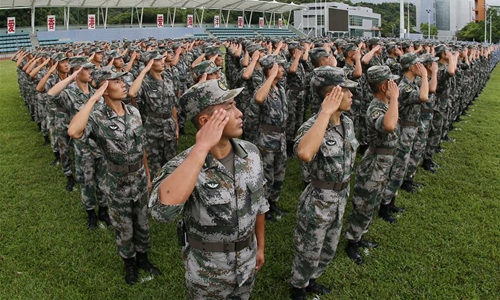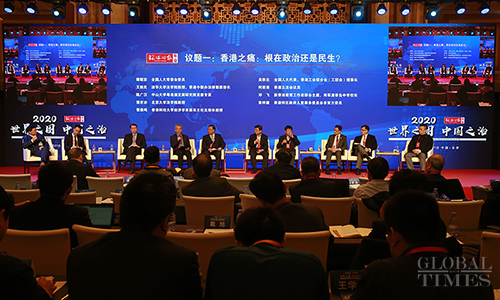HOME >> CHINA
Overhaul necessary to stop violence, ensure long-term stability: experts
By Wang Cong and Yang Sheng Source:Global Times Published: 2019/12/22 20:58:39 Last Updated: 2019/12/23 9:17:45

Soldiers attend a national flag-raising ceremony at the Ngong Shuen Chau barracks of the Hong Kong Garrison of the Chinese People's Liberation Army (PLA) in Hongkong, South China, August 30, 2019. Photo: Xinhua)
As Hong Kong continues to grapple with declining yet persistent political unrest that has plunged the city into what officials call the biggest crisis since its return to China more than 22 years ago, the path to heal and reconstruct appears bumpy, as secessionists in the city and their foreign backers remain largely unchecked, and deep-seated political and social issues in the city persist.Under such a grim outlook, the Hong Kong Special Administrative Region (HKSAR) government and the broader society are facing a slew of pressing and delicate tasks for 2020 and beyond that require both immediate and more effective measures to end the violence as well as overhaul to the city's political, social and economic systems to close loopholes that threaten both the city's future and the national security, experts said at the Global Times' Annual Forum on Saturday.
While months of violent and radical riots appear to be declining in scale and frequency thanks in part to the hard work of the city's police force which has arrested more than 6,000 people, some radicals continue to plan or carry out violent acts.
On Friday, a man reportedly fired live rounds at police officers before being arrested. There were also reports of vandalism of shops in the city over the weekend.
"Although the HKSAR government and many Hong Kong residents who are affected by the turmoil sincerely want to start the recovery as soon as possible, it doesn't mean Hong Kong won't have new problems and the opposition groups, separatists, anti-China forces and foreign forces will stop and give up," Tian Feilong, associate professor at Beihang University in Beijing and a member of the Beijing-based Chinese Association of Hong Kong and Macao Studies, told the Global Times on Sunday.
Tian noted that after having won the district council election in November, the opposition will likely make more trouble next year ahead of the scheduled HKSAR Legislative Council election in September.
Some experts also warned that foreign interference in China's internal affairs related to Hong Kong could soar in 2020 as they would likely continue to instigate chaos in the city to contain China's rise.
The US has already made the Hong Kong Human Rights and Democracy Act a law and so the US government is now authorized to launch more interference over Hong Kong affairs, they noted.
"There are clearly foreign forces and they have become more apparent just recently," Tam Yiu-chung, former chairman of the Democratic Alliance for the Betterment and Progress of Hong Kong, said at a panel discussion during the Global Times' Annual Forum on Saturday. "It's hard to say when the riot will stop because only those who started the riot know."

Photo: Li Hao/GT
Deeper challengesMonths of political unrest have also damaged the city's economy, which is expected to record its first annual recession since the global financial crisis a decade ago.
"The economy could face even more challenges in the future," Liang Haiming, a Hong Kong-based economist, told the Global Times on Sunday, noting that the economy could shrink by as much as 2 percent in 2019. "If social unrest does not stop, stimulus measures, such as promoting tourism, will come to no avail."
Further complicating the situation are deep-seated social and political issues from housing to unemployment to loopholes in the legal system that have been laid bare over the past few months and pose serious challenges for the city to recover and rebuild, experts noted.
"What the rioters did was unacceptable but there are some residents who sit idle and hope that the riots may change 'unfairness' in society," Stanley Ng Chau Pei, president of the Hong Kong Federation of Trade Unions, told the panel discussion on Saturday.
Also pressing is overhaul of the city's legal apparatus, which has sent mixed signals in dealing with cases related to the riots and has clearly failed to prevent events that threaten national security.
Junius Ho Kwan-yiu, a member of HKSAR Legislative Council, said Saturday that while it was necessary to pass a national security law, known as Article 23 of the Basic Law, it was more imperative to reform the city's justice system.
"Before passing Article 23, we must first carry out reforms in legal, political and justice systems," Ho told the panel discussion on Saturday, noting that the law, even if passed, would need cooperation from a "powerful" legal, political and justice system.
Newspaper headline: Challenges remain as HK tries to heal
Posted in: SOCIETY,HK/MACAO/TAIWAN